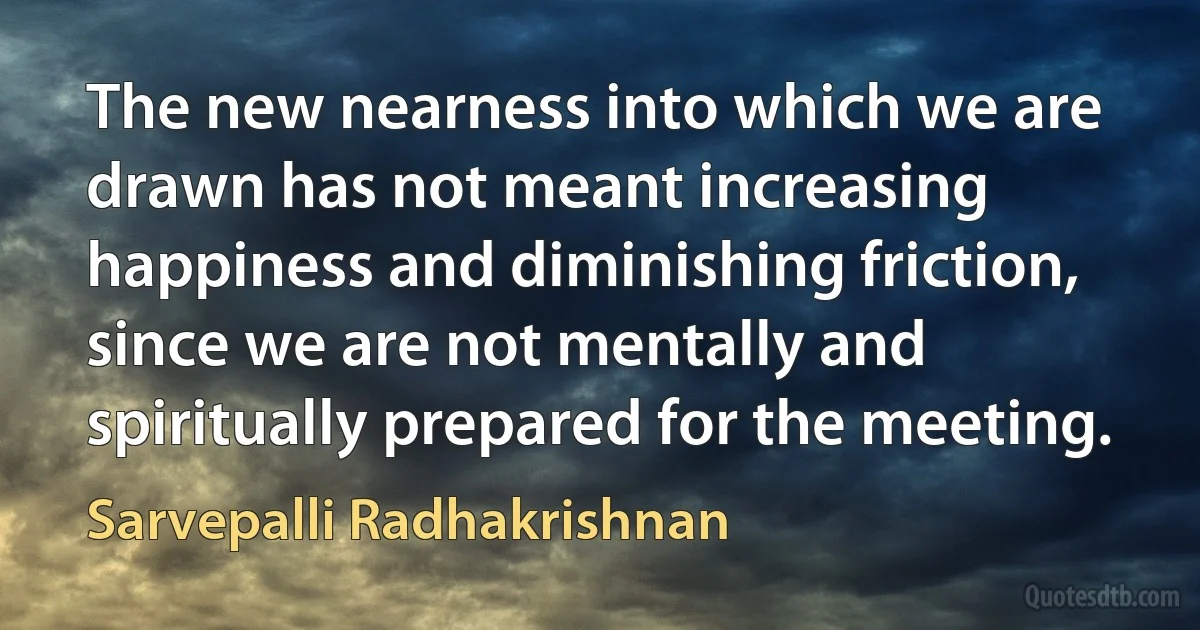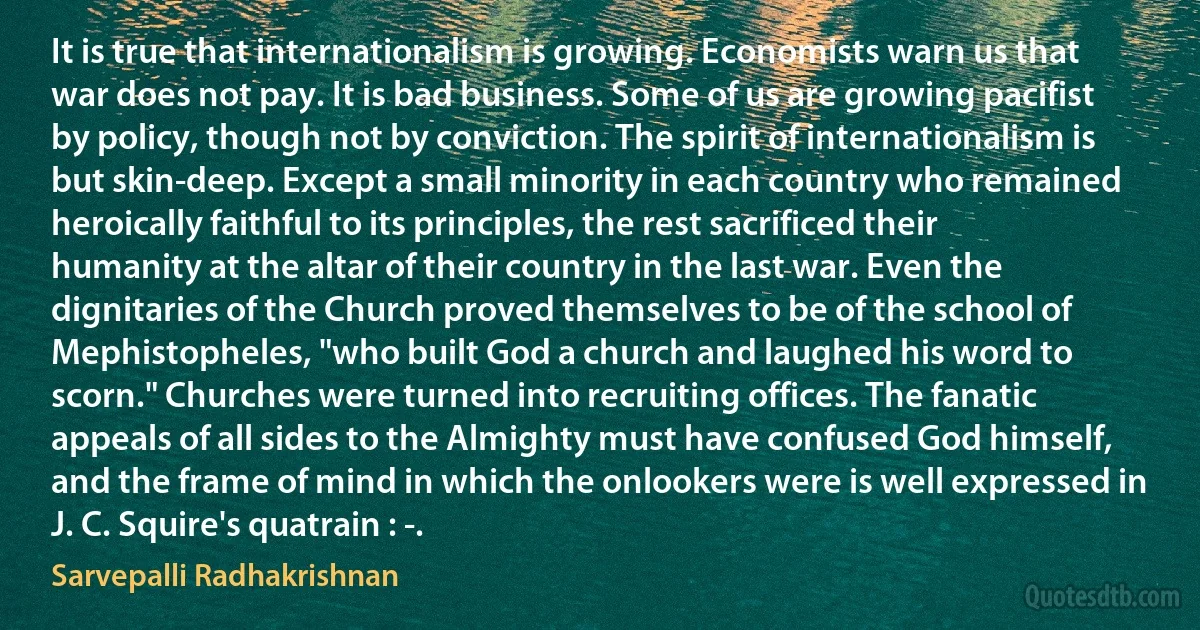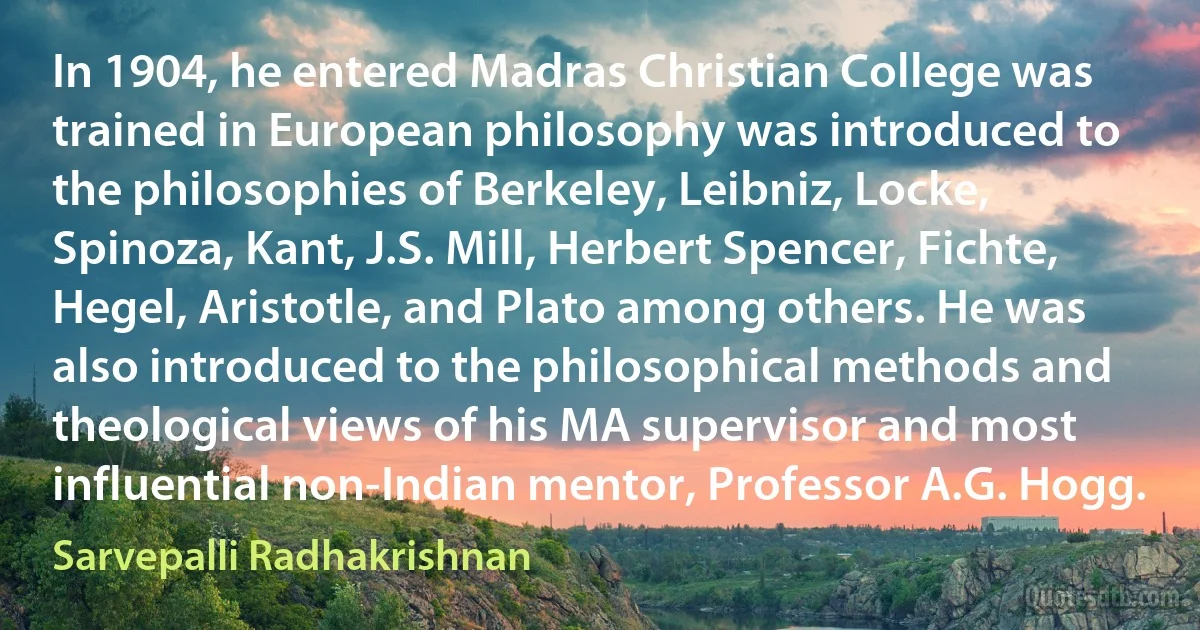Sarvepalli Radhakrishnan quotes - page 4
Among the thoughtful men of every creed and country there is a note of spiritual wistfulness and expectancy.
If we leave aside the fanatics with whom no argument is possible, the leaders of every historical civilization to-day are convinced that mankind in all its extent and history is a single organism, worshipful in its growing majesty and capable of a capable of a progress upon which none dare set any bounds.

Sarvepalli Radhakrishnan
The presentation of facts in logical form contributes to a confusion between discovery and proof. If the process of discovery were mere synthesis, any mechanical manipulator of prior partial concepts would have reached the insight and it would not have taken a genius to arrive at it.

Sarvepalli Radhakrishnan
Hinduism accepts all religious notions as facts and arranges them in the order of their more or less intrinsic significance. The worshippers of the Absolute are the highest in rank; second to them are the worshippers of the personal God; then come the worshippers of the incarnations like Rama, Kṛṣṇa, Buddha; below them are those who worship ancestors, deities and sages, and the lowest of all are the worshippers of the petty forces and spirits.

Sarvepalli Radhakrishnan
He had raised himself step by step. When would he reach the summit of the Mount Everest of his career? Would he aspire to higher things in the life and emulate such a man as Woodrow Wilson, who has at one time a professor; and ended up as President of the United States of America?

Sarvepalli Radhakrishnan
In Indian Philosophy he not only laid a stone foundation surely and truly but also built an edifice that shall outlast any philosophic storm. It was not so much a history as an exposition, and the exposition was vivid, vital and gripping. It was full of feeling. It made an epoch by itself. It was the two volumes of Indian Philosophy in the "Library of Philosophy" that showed that there was hardly any height of spiritual insight or rational philosophy attained in the world that has not its parallel in the vast stretch he dealt with that lies between the early sages and the modern Naiyaikas [leaders].

Sarvepalli Radhakrishnan
The truths of the ṛṣis are not evolved as the result of logical reasoning or systematic philosophy but are the products of spiritual intuition, dṛṣti or vision. The ṛṣis are not so much the authors of the truths recorded in the Vedas as the seers who were able to discern the eternal truths by raising their life-spirit to the plane of universal spirit. They are the pioneer researchers in the realm of the spirit who saw more in the world than their followers. Their utterances are not based on transitory vision but on a continuous experience of resident life and power. When the Vedas are regarded as the highest authority, all that is meant is that the most exacting of all authorities is the authority of facts.

Sarvepalli Radhakrishnan
He attended Elizabeth Rodman Voorhees College in Vellore, a school run by the American Arcot Mission of the Reformed Church in America where he was introduced to the Dutch Reform Theology, which emphasized a righteous God, unconditional grace, and election, and which criticized Hinduism as intellectually incoherent and ethically unsound. This is where he encountered what would have appeared to him as crippling assaults on his Hindu sensibilities. He also would have witnessed the positive contributions of the social programs undertaken by the Mission in the name of propagation of the Christian gospel.

Sarvepalli Radhakrishnan
Tagore was his most influential Indian mentor. Tagore's poetry and prose resonated with him. He appreciated Tagore's emphasis on aesthetics as well as his appeal to intuition. From 1914 on, both of these notions - aesthetics and intuition - begin to find their place in his own interpretations of experience, the epistemological category for his philosophical and religious proclivities...he would repeatedly appeal to Tagore's writing to support his own philosophical ideals.

Sarvepalli Radhakrishnan
During the 1930s and 1940s the issues of education and nationalism came together for him, and his vision was of an autonomous India. He envisioned an India built and guided by those who were truly educated, by those who had a personal vision of and commitment to raising Indian self-consciousness.

Sarvepalli Radhakrishnan



